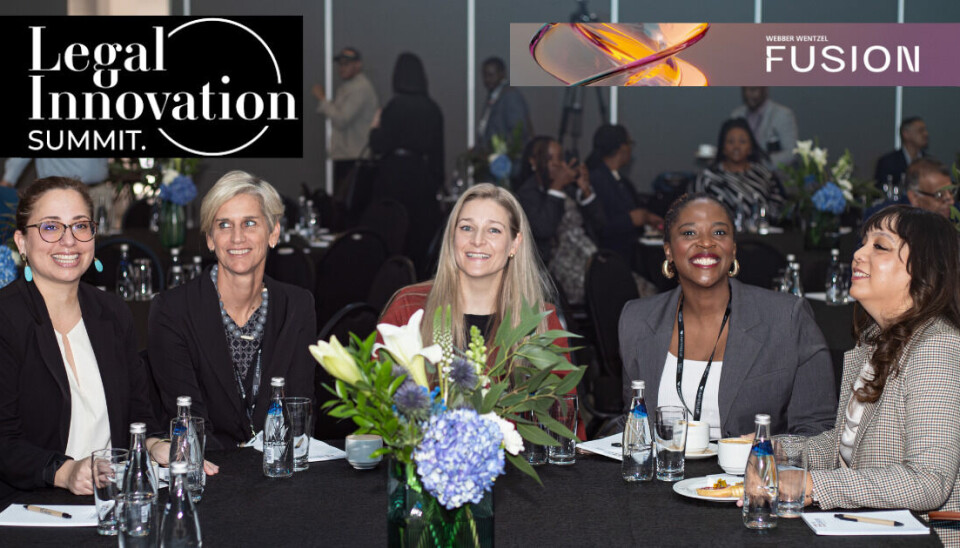Copyright : Re-publication of this article is authorised only in the following circumstances; the writer and Africa Legal are both recognised as the author and the website address www.africa-legal.com and original article link are back linked. Re-publication without both must be preauthorised by contacting editor@africa-legal.com
Alive with energy and urgency: a report on the recent Legal Innovation Summit

On 28 August, a first Legal Innovation Summit in Johannesburg brought together the sharpest minds in legal practice, tech, and policy to unpack how innovation is reshaping the legal profession Webber Wentzel Fusion team members Nurie Jappie and Ruth Gondwe reflect on a day of innovation and insights
Whether attendees showed up in person or joined online, the recent Legal Innovation Summit held in Johannesburg was an energising experience and offered a wealth of insights into how legal practice is evolving in the age of artificial intelligence, say Nurie Jappie and Ruth Gondwe of Webber Wentzel Fusion.
“Even though I joined remotely, the Summit felt alive with energy and urgency,” says Nurie, a specialist in innovation and improvement of legal services delivery. “Thanks to Naomi Thompson and her team, digital attendees were made to feel as much a part of the conversation as those in person; a fitting example of innovation in action.”
Both Nurie and Ruth were impressed by Professor Richard Susskind’s powerful opening keynote, which set the tone for the Summit as the legal profession stands at a crossroads, with rapid evolutions in artificial intelligence and other technologies.
“His message was clear, ‘the market will show no loyalty to those doing things the old way’,” says Ruth, a Manager at Webber Wentzel Fusion whose background includes litigation, in-house counsel, legal technology, and legal operations. “There’s an urgency for legal professionals to embrace innovation that delivers cheaper, quicker, higher quality, and more convenient outcomes for clients.”
Susskind used the analogy of a Black & Decker power drill. Customers don’t want the drill; they want the hole it creates. Similarly, legal practitioners need to shift focus from method of delivery to the solutions, systems, and outcomes clients truly need.
“He distinguished between automation (digitising existing tasks) and innovation (creating new ways of working), urging the profession to move beyond mere efficiency and toward transformative change,” says Ruth.
Susskind’s opening keynote was followed by “some of the most engaging panels I’ve experienced’, says Nurie. First up, In-house counsel discussed their evolving role, the importance of ‘being in the room’ before times of crisis, and the transformation of legal teams in “Business Catalysts: In-House Teams as Strategic Business Drivers”.
The next panel on “AI Governance & Innovation in Africa: Ethics, Cybersecurity & Opportunity” was illuminating, say Nurie and Ruth, with the panel highlighting the risk to Africa of becoming a ‘dumping ground’ for AI systems that have been under-tested or banned elsewhere, or adopting foreign AI policies wholesale, rather than developing regulatory frameworks tailored to the continent’s unique needs.
“One panellist posed a critical question: ‘Do you know your organisation’s data cycle?’,” recalls Ruth. “This drove home the point that understanding data governance is foundational to any AI strategy. Digital regulation is now a core business issue, not just a niche legal concern.”
The morning’s final panel, “AI & Technology Adoption: Practical Use Cases in Legal & Cross-Industry Transformation”, was a practical discussion on AI adoption across industries, with the expert panel agreeing AI without governance is only hype. A core insight was that AI adoption must be business-led, not solely driven by IT, with a McKinsey report showing 95% of firms had implemented some form of AI, but around 80% of those initiatives had failed over the past two years.
Here Aalia Manie, head of Webber Wentzel Fusion, offered one of the day’s key contributions, says Nurie. “She stressed the importance of focusing on real use cases that align with client priorities. For legal professionals, trust and defensibility matter more than speed. Repeatability and reliability of outputs are non-negotiable, adoption requires behavioural shifts at every level. The path to sustainable value is through upskilling, clear governance, and measured implementation.”
The Legal Innovation Summit’s afternoon brought further inspiration, starting with Zoe Mabie of Google delivering an “energising and inspiring” keynote on “How AI, Tech Giants, are Shaping What’s Next. Preparing Talent for an AI-Driven Future”,
Mabie highlighted the need for businesses to create environments where experimentation is embraced and focus is placed on investment in workflows and data security, and training staff to not only use AI but critically interrogate its outputs, while remaining bold. “For me, her message resonated deeply,” says Nurie. “AI will not replace lawyers, but lawyers who fail to adapt risk being left behind.”
Later, Aalia Manie joined Legora onstage for a practical showcase of Legora Legal AI’s capabilities to support contract review and large-scale document analysis, and how collaborative design partnerships are producing real solutions in Africa’s legal market. “The key takeaway was the importance of choosing tech partners who understand your starting point and are willing to walk the journey with you, rather than pushing one-size-fits-all solutions,” says Ruth, who also enjoyed the personal transformation stories that added depth to the Legal Innovation Summit.
Overall, Ruth and Nurie, like other attendees online and in person, came away feeling energised and inspired by the Legal Innovation Summit,
“By the close, a clear theme had emerged: innovation in law is not simply about deploying tools, but reshaping mindsets, building ecosystems, and putting people at the heart of transformation,” says Nurie. “I left encouraged that Africa’s legal future will be defined not only by agility and courage, but also by ethics, inclusivity, and a willingness to constantly reinvent. The summit reminded me that the journey toward reimagining law has already begun — and it is one we must all take together.”
